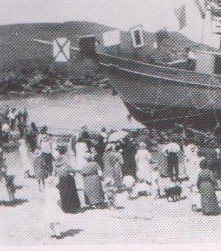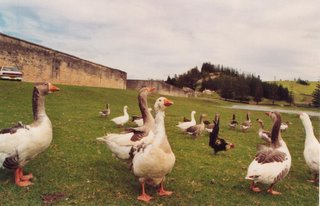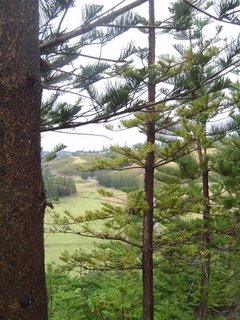ETHNIC CLEANSING - BY STEALTH?

I was cautious about using the term "ethnic cleansing", because I did not want to belittle the very real physical suffering, homelessness and alienation that has been experienced by hundreds of thousands of people in places like the Sudan and other countries in Africa, the Balkans, the Middle East, and in Germany during World War 11. No doubt almost every Australian would wish to dissociate themselves from any attitude or value system that would make the rights of one ethnic group of less importance than another.
There is also a recognition of the fact that, although it was the Bounty descendants from Pitcairn Island who were given Norfolk Island as their homeland, there has been a continual process of new people joining the community since 1856. Some have married into Island families, others have come to enjoy the special character and lifestyle of the place, still others have seeking business and economic activities, or opportunities to utilise and exercise special skills not available in the local community. Many of these people have burned their bridges behind them, become very much a part of the community, and there are a number of non-Pitcairn families who have been here for some generations.
For this reason, I try to avoid using the words "Norfolk Islander" and try to say "Norfolker", and refer to that special Norfolk Island character and culture as "the Norfolk identity" or "the Norfolk way"( a term we hear quite a bit now.) That is not to say that the very special Pitcairn heritage, and the attitudes and values that have come with it are not still responsible for much of what makes this island unique.
Over the past couple of decades, we have seen an erosion and watering down of this Norfolk identity. I do not mean the changes that have come with more intermarriage with non-Norfolk Islanders, or the changes that have come about with improved transport and communication links with "the mainland." I refer rather the steady and insidious "Australianisation" that has been forced on us over a period of time.
No doubt, border control issues played a part(and still do), and in the early Eighties, many Norfolk Islanders were forced to face the fact, for the first time, that if they were to apply for a passport, it must be an Australian one. Many older islanders were born citizens of Norfolk Island, and had no concept of being anything else, although they valued their close association with Australia..and New Zealand too, for that matter. When passports became necessary, and no Norfolk Island passport was possible, many became Australian citizens almost "by default." There were also a number of Norfolk Islanders and Norfolk people who held New Zealand citizenship, and at first this was no problem. A smaller group of Norfolk people held citizenship in other places, such as Great Britain and the United States. Indeed, many had migrated to Norfolk Island direct from those places, and had not even considered they were migrating to Australia.
Then there came a requirement from Canberra that enfranchisement and voting rights should only apply to people from the British Commonwealth, and our American friends at least needed to consider taking out dual citizenship.
Then more and more frequently, we began hearing from Commonwealth officials and government representatives the line about Norfolk people deserving to enjoy the same rights as all other Australians. It seemed to mark a definite trend and shift in official policy, and it led to several undesirable things
1. A move by Australia to bring us into their electoral system. A local referendum made it clear that we did not desire this. Nevertheless, we given an optional right to vote either in a Canberra electorate, or in an electorate with which we had a close association (the latter applying mainly to people here for a short term.)
2.Moves to give any Australians who were residing on Norfolk Island the same electoral rights on the island as they would enjoy back in Australia. Once again against the expressed wishes of the Norfolk people it was decided that any Australian residing on the island would be entitled to vote in local elections after just 6 months. Not only was this a far shorter period of qualification than would apply to any immigrant into Australia, but it threatened to cause a shift in the delicate balance of views and voting on local issues, because these people had not had nearly enough time to understand local issues or the candidates standing for election.
3.Disenfranchisement of any resident who did not hold Australian citizenship. It is true that no one already on the electoral roll would be taken off, but any non-Australian citizen was disqualified from standing for election, and thus became a second-class citizen of Norfolk Island. At the time, even some of our Legislative Assembly members were non-Australians, and had to take out citizenship to stand for re-election! In some cases this affected people who had lived on the island for decades, and some who had been born here. Even some Norfolk Islanders, who perhaps held New Zealand citizenship, and had lived away from the island for some years, returned home to find they had no right to participate in the local electoral process.

Meanwhile, there were increasing numbers of visits from Canberra officials, bureaucrats, and government ministers paying lipservice to their respect for our local culture and heritage. However, it became clearer and clearer that they merely regarded us as another part of "multicultural Australia." They had, and still have, no concept of Norfolkers as being a people with a completely separate history, a people who had never chosen to migrate to or settle in Australia. We did not want them to include us into their patronising welcome to other ethnic groups to become a part of their Australian melting pot of cultures. I recall one occasion when representatives of the Maori people returned the island to receive back the "patu" that had been given to Gidley King by their predecessors. It was a very special dawn ceremony at Kingston. The then Parliamentary Secretary in the Dept. of Territories, Warren Snowdon, spoke most condescendingly about Australia respecting and wanting to preserve our culture in the same way as it did the Aborigines. A bit of a worry.
Now in more recent times, there has developed another trend in Canberra's tactics. This has come with a steady and consistent undermining and criticism of the ability of our government to provide the sort of infrastructure, services and facilities "that should be enjoyed by Australians." For instance, more than one Inquiry (and there have been plenty recently) has referred to our hospital as "third world." They know that mentioning health is sure have an emotional appeal. True third world communities would be staggered! In fact, prior to the South Pacific Mini-games, which the island hosted in 1999(?), our medical facilities were inspected by officials from other Pacific islands, and they regarded them as a whole as far superior to those they enjoyed back in their own home islands.
This current Canberra plan, if allowed to be carried out, will almost complete our "homogenisation" into the Australian scene. Even if it does bring economic and material benefits...and we doubt that it will.... it will lead to the erosion, even loss of a very special identity and way of life, and threaten the spirit of a unique community that Canberra obviously regards as an irritating anomaly.
Do Australians really think that their culture, their heritage, their "way" is superior to that of the people of Norfolk Island?
If they only thought about it, we could hold us up to the world as the "jewel in their crown" instead regarding us as a thorn in their side!!







